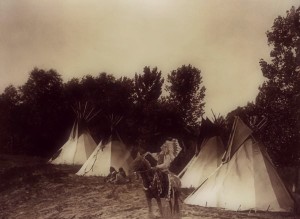By using our website, you agree to the use of cookies as described in our Cookie Policy
WHITE BOY BECOMES AN INDIAN

Narrative by Charles Morris, of Kerrville, Texas
A family by the name of Fischer lived just below the Morris Ranch in Gillespie county in the early days, and in about 1868 the Indians made a raid through that section and carried off one of the Fischer boys. The red men were in the habit of coming in frequently, during the light of the moon, to steal horses and settlers throughout that section suffered much through these raids. The Fischer boy, at the time of his capture, was about twelve years old, and he was carried to the Indian Territory, where he grew up in the Indian camp and became one of the tribe. Years later he was found by the United States soldiers and was returned to his people. They dressed him in civilized garments and used every effort to make him contented,but he had become so thoroughly Indianized that he returned to the tribe after staying with his parents only three or four weeks. The young man had married an Indian girl, and thoughts of his wife and children off in the Indian Territory, and the wild life he had been raised to, called him back; civilization had no attractions for him. His father tried to get him to bring his wife and children and live with him, but he refused, saying the white people would always look upon his wife as a squaw, and she would not be happy there. His father gave him a horse to ride, and he made the trip back to his Indian, friends with a party driving cattle to St. Louis. Nearing his tribe in the Territory, he bade his friends goodbye, and exchanging his white man's clothing for the Indian garb, he rode away to his squaw and his papooses.
_____________________________________
_____________________________________
This Fischer was living a few years ago at Apache, Oklahoma. He has a brother, Otto Fischer, living at Fredericksburg. This brother at one time went to visit his Indian brother in the Indian Territory, going from the railroad station to the reservation in a buggy. When he reached his brother's place he found him sitting on the doorstep repairing a piece of harness. Otto alighted from the buggy and walked up and said, "Hello." The brother merely said, "How," but never offered his hand, nor even looked up. That seemed to be the Indian style of greeting. The next day when Otto Fischer was ready to return home he bade his brother goodbye, but the brother got in the buggy with him and said, "me going with you." And he made the trip to near Fredericksburg In his old work clothes, the same he was wearing when Otto reached there. He remained a few days with his parents and then returned to his tribe in Oklahoma.
Some time in 1892 I was on a train going from Fort Worth to Pecos, and across the aisle was Chief Quanah Parker and one of his wives. Quanah Parker's mother was a white woman, Cynthia Ann Parker, who had been captured by the Indians when she was a very small child, and after about twenty-eight years captivity she was recaptured by Sul Ross' rangers. I asked Chief Quanah, on the train, if he knew a German in the Territory by the name of Fischer. "Fischer?" he said, "A German named Fischer." He repeated the name over several times, and finally said, "You mean a Dutchman, don 't you? a Dutchman by the name of Fischer? Oh, yes, I know him. He well fixed, has fine farm, much cattle. Oh, he is all right.”
I also asked Quanah Parker if he had ever been on any raiding expeditions on white settlements and he laughed and said, "Oh, yes." When I asked if he was a good shot, he laughed again as if it was quite a joke. "Oh, yes,” he said, "I got shot in knee once; makes me limp now, and once a bullet scraped my side and if he had gone little further over it got me," and he laughed over it. The chief was on his way to New Mexico to bring back some of his tribe that had run off. He said he only wanted to get the men, and when he rounded them up to take them back the squaws would follow.
Chief Quanah Parker was one of Theodore Roosevelt's guests at one time when "Teddy" was on a hunt in Oklahoma.
20,000+ more pages of Texas history, written by those who lived it! Searchable flash drive or DVD here
$129.95
‹ Back




